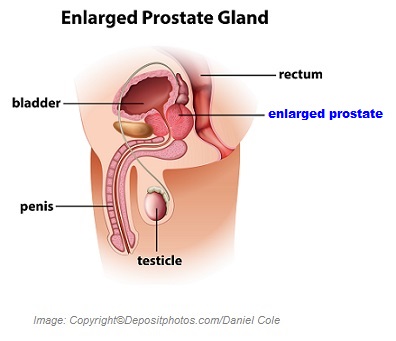 of the prostate gland. Being a very common disease in men, it affects about 50% of men age over 50. In BPH, the prostate gland gets enlarged and compresses the urethra passing through, leading to partial obstruction of the urinary tract.
of the prostate gland. Being a very common disease in men, it affects about 50% of men age over 50. In BPH, the prostate gland gets enlarged and compresses the urethra passing through, leading to partial obstruction of the urinary tract.
The exact cause of hyperplasia is unknown. However, age-related hormonal imbalance could be a key contributing factor. It is believed that dihyrdotestosterone (DHT), an active metabolite of testosterone, has an important role in the process.
The signs and symptoms of BPH are related to the compression of the urethra, and they include decreased caliber and force of the urinary stream, increased frequency of urination, dribbling, hesitancy, incomplete emptying of the bladder, burning feeling with urination, nocturia (increased nighttime urination), and urinary tract infections.
Nutritional Supports:
Restricted Foods:
- Saturated fats.
- Trans-fats.
- Sugar and sweets.
- Processed foods.
- Alcohol.
- Caffeinated beverages.
- Soft drinks.
- Foods high in tryptophan. Tryptophan may increase secretion of prolactin. This hormone increases the uptake of testosterone by the prostate, which may aggravate the enlargement.
- Black pepper. It may aggravate symptoms of BPH.
Recommended Foods:
- Drinking plenty of water: at least 2 liters a day.
- Whole grains.
- Foods high in fiber.
- Legumes.
- Flaxseeds.
- Foods high in zinc: legumes, sunflower seeds, and pumpkin seeds.
- Cold water fish.
- Garlic.
- Foods high in lycopene: gac, tomato, watermelon, and grapefruit.
- Fresh fruits and vegetables: 6 to 8 servings a day.
- Food high in bioflavonoids: berries.
- Foods high in amino acids glycine and alanine. These two amino acids reduce symptoms of BPH.
- Soy products. They contain phytosterols, which improve symptoms of BPH.
- Reishi mushroom. It contains ganoderic acid, a phytonutrient that reduces the conversion of testosterone into dihydrotestosterone (DHT) by inhibiting the enzyme 5-alpha reductase.
Recommended Supplements:
- Omega – 3 Fatty Acids: 2 -3 grams a day. They reduce inflammation.
- French Maritime Pine Bark Extract: 100 – 200 mg a day. It reduces inflammation and improves blood circulation.
- Grape Seed Extract: 50 – 100 mg a day.
- Zinc: 50 – 100 mg a day.
- Saw Palmetto: 320 – 640 mg a day. Saw palmetto inhibits conversion of testosterone into dihydrotestosterone (DHT).
- Beta – Sitosterol: 60 -120 mg a day.
- Rye Pollen Extract (Cernilton): 500 – 1000 mg a day. Cernilton reduces inflammation, improves symptoms of BPH, and blocks growth of prostate cells.
- Pygeum Africanum (containing 13% total sterols): 100 – 200 mg a day.
- Nettle Root Extract: 120 – 240 mg a day. It reduces symptoms of BPH.
- Glycine: 500 – 1000 mg a day.
- Alanine: 500 – 1000 mg a day. Along with glycine and glutamic acid, alanine may reduce symptoms of BPH.
- Multivitamins – Multiminerals: A high potency product.
Miscellaneous Suggestions:
- Exercise: studies show that there is a link between an increased physical activity and a decreased risk of developing BPH.
- Liver detoxification.
- Colon cleansing.

